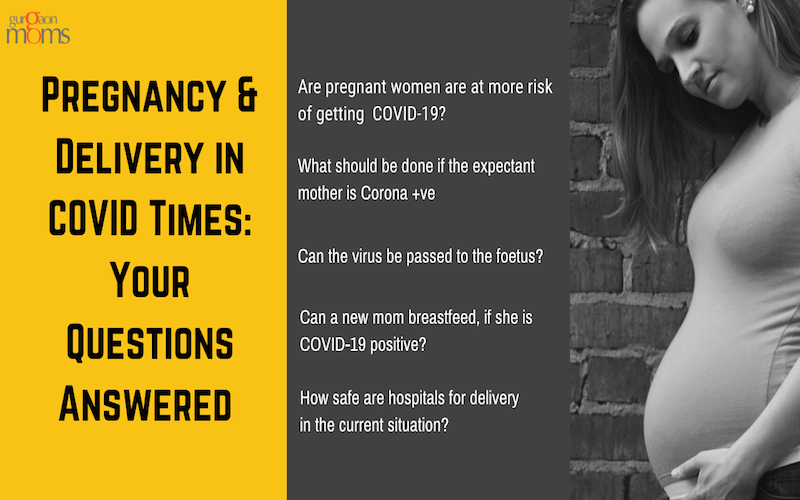The anxiety related to pregnancy & delivery during the current COVID-19 scenario can be both stressful and challenging for moms-to-be . The rapid spread of the virus have raised many fears, queries and doubts especially in pregnant women and their families.
Dr Reubina KD Singh ,MS – Obstetrics & Gynaecology, MBBS ,Infertility Specialist at Grace IVF & Women Centre answers all the relevant questions related to this
Are pregnant women are at more risk of getting an infection especially COVID -19?
As this is a novel virus, little is known still about its impact on pregnancy. Generally, pregnant women do not appear to be at more risk to catch the infection than the usual population. But as pregnancy changes the body’s immune system and its response to various viral infections, which can at times be associated with more severe symptoms.
Some reported cases of COVID-19 infection in pregnant women are milder and have a good recovery rate. However, pregnant women who have heart condition are at the highest risk. The Covid-19 epidemic raises the risk of perinatal anxiety and depression in pregnancy. Therefore, it is very important to strengthen support for pregnant women and their families and their mental health should be checked at every contact.
Pregnant women should follow government guidance on how to stay alert and safe while maintaining strict social distancing. They should avoid anyone who is showing symptoms of coronavirus. Especially, if the pregnancy is in the third trimester (over 28 weeks), then you should be very attentive to social distancing.
What should be done if the expectant mother has COVID?
In case, you are tested positive with COVID-19 when you are pregnant, you can show either no symptoms or a mild illness from which you can fully recover soon. So don’t panic! However, if you show severe symptoms then you would need enhanced care. You must contact your doctor and the maternity care team immediately.
In general, pregnant women who get infected with COVID-19 must follow all the advice of their OB-GYN. This means staying at home except to get medical care and maintain a safe distance from your family members at home. If you have been advised to self-isolate, then you should stay indoors and avoid meeting anyone for 7 days. But if you live with other people at home, then isolate for at least 14 days and keep a close watch on your symptoms and stay in regular touch with the doctor.
As per ICMR Guidance :
The treatment is planned according to the symptoms – if the pregnant women has come in close contact with the confirmed case of COVID-19 then ICMR advises to get her covid-19 testing done –
– Tested Negative – Isolate till the report comes but if its negative – no monitoring or treatment required
– Tested positive but asymptomatic- Monitoring at home , home isolation , defer antenatal visits and ultrasounds but monitor fetal movements at home , stay in touch with physician and obstetrician.
– Tested positive and is having symptomatic (fever – 38*c and respiratory symptoms )- Isolation in a separate room at home with oxygen cylinder handy and if condition deteriorates then hospitalization is indicated .
What precautions should expecting moms take to protect themselves?
Pregnant women must follow the same guidelines as everyone else. This includes thorough hand washing (for at least 20 seconds with warm water and soap), not touching your face, eyes, nose, or mouth, and strictly follows social distancing (do not go out unless an emergency or medical help required and stay at least six feet apart from others.) The Centers for Disease Control also recommends wearing cloth masks and not a surgical or medical-grade mask.
Precautions for pregnant women against COVID-19:
Here are some actions that pregnant women should take to prevent contracting the disease during pregnancy:
- Wash your hands frequently. Hand hygiene is very important for protecting you from any exposure to COVID-19. Use any alcohol-based hand sanitizer containing 60% to 95% alcohol or wash your hands frequently with soap and water for a minimum of 20 seconds.
- Practice social distancing. Stay at a distance of at least 6 feet or 2 meters from other people when you are in a public place and avoid any contact with others.
- Ensure to get your flu vaccination in a timely manner. Though it does not protect you from COVID-19, but it will make you less vulnerable to influenza, which could cause complications during pregnancy.
- While coughing or sneezing, use a tissue and discard it in the dustbin. Immediately wash your hands after that.
- Do not ignore any symptoms of respiratory problems. If you have a cough or any respiratory distress, call your doctor immediately.
- Consider virtual consultations with your doctor rather than prenatal clinic visits to your gynaecologist. Avoid spending a lot of time in the doctor’s waiting room or if you are going to the hospital. However, when some tests are required like blood tests, ultrasound, and foetal testing, then visit with all precautions.
- Work from home as much as possible.
- Be alert to symptoms like high fever accompanies with or without cough, as that may indicate a possible COVID-19 infection. Avoid any close contact with anyone who is showing these symptoms.
Can the virus be passed to the foetus?
There is also no evidence so far that proves vertical transmission, meaning the ability of the virus to pass to an unborn baby during pregnancy. Currently, there are no documented cases of any vaginal secretions being tested positive for coronavirus. So far, no indications have been observed that COVID-19 can be transferred to an unborn baby. After birth, however, the transmission is possible in case the baby is exposed to a COVID-19-positive caregiver, or if the mother is infected. Presently, there are also no documented cases of breast milk being tested positive for coronavirus.
Early observations have shown that newborns have a very less chance to develop symptoms of the infection or get a severe form of it. However, enough information is not available as of now to prove why babies are less likely to get infected or why they don’t get as frequently sick from the virus as adults. The present data also does not suggest an increased risk of miscarriage or any early pregnancy loss because of COVID-19. There is no proof as of now to show that the virus is teratogenic(birth defect ), and long-term data is awaited for that. COVID-19 infection is presently not showing an indication for Medical Termination of Pregnancy.
Can newborn babies catch the virus after birth?
Although this is rare, infants under the age of one are at higher risk of illness with COVID-19 as their immune system is still immature and they have smaller airways, which increases the chances of developing breathing issues along with respiratory virus infection. Newborns can be infected with coronavirus during childbirth or if they are exposed to sick caregivers after delivery.
The American Academy of Paediatrics has recommended special care for newborn babies who are born to women who are COVID-19 positive or are suspected to be infected. This may mean temporarily separating the mother from the newborn baby to reduce the risk of infecting the baby. Then, the baby is monitored for signs of infection, and, if the signs persist, then the test for COVID-19 is done for the newborn.
Usually, the COVID-19 symptoms are much milder in babies and children as compared to adults. In a study recently published in Paediatrics of COVID-19 in case of Chinese children, almost 90% of the ones who tested positive had mild symptoms or no symptoms at all. As newborn babies and toddlers are unable to wear a face mask, it is very important to safeguard and protect them in all other ways.
Can a new mom breastfeed, if she is COVID-19 positive?
As of now, there is no evidence of the COVID-19 virus found in breast milk. The virus is known to spread through respiratory droplets, and therefore, mothers should regularly wash their hands and wear a face mask to reduce the baby’s exposure to the virus. Though coronavirus is not found in the breast milk, in case you are infected, you could spread the virus to your newborn baby through tiny droplets coming out while you talk, sneeze, or cough .In most of the cases, if you are sick, you should express your breast milk and give it to your baby.
Before expressing the milk in a bottle, you must:
- Wash your hands properly before expressing milk, touching the bottle, or breast pump.
- If you are fine and your doctor permits, wear a face mask while nursing.
- Let someone else who is not infected, give your baby the expressed breast milk.
- Try to limit close contact with your newborn baby, and always cough and sneeze into a tissue, and then immediately throw it away.
How safe are hospitals for delivery in the current situation?
Are you worried about your time in the hospital after delivery? Could this increase the risk of getting COVID-19?
As per the government guidelines, the hospital staff and your obstetric team try to minimize the number of people visiting the hospital. There are strict rules to ensure that people who need to be tested for COVID-19 would be isolated from all the other patients.
In fact, all medical staff and teams are working hard to make sure that the expectant mothers have a low risk of being exposed to COVID-19. Various hospitals are taking many precautions to minimize exposure risks. After your delivery, it might be possible that you can go home sooner than in a usual scenario, but that is dependent on how you feel and if your delivery was uncomplicated. You can discuss this with your obstetric team. Though patients with severe symptoms of COVID-19 are visiting hospitals, most hospitals have strict protocols in place, which differentiate people showing coronavirus-like symptoms, and those who are seriously ill. The ones who show mild symptoms are mostly quarantined at home. So, it should be fine to continue your plans for hospital delivery. If you still have doubts, then you could verify that your hospital is adhering to the stipulated infection control policies or not.
Besides all this, it’s imperative to keep yourself safe, too. So, follow good hand hygiene, wipe and clean the surfaces you come into contact with.
Should pregnant women keep their regular scheduled appointments and screenings during this period of restrictions?
Prenatal visits are essential to ensure the health of the pregnant lady and the baby growing inside. However, due to the current global pandemic, many doctors are either decreasing the clinic or hospital visit and encouraging online consultations. But, if you feel any concerns regarding your health or your baby’s health, then please call your obstetric team.
Antenatal Care Guidelines by ICMR
- Women are advised to go for their routine antenatal care, which is customized to a minimum. The maternal care provider determines these visits at 12, 20, 28 and then 36 weeks of gestation, unless they are meeting the current self-isolation criteria.
- For pregnant women with COVID-19 symptoms, their scheduled appointments are deferred for 7 days when the symptoms begin, unless symptoms (other than persistent cough) become severe.
- If you are required to visit a health center, you should travel in your own transport or call 108 for an ambulance, informing the staff about your status.
- If you are self-quarantined as someone in your family has possible symptoms of COVID-19, then your scheduled appointments should be postponed for 14 days.
- If you have a routine appointment that has been delayed for over 3 weeks, then your health care providers will contact you. (In rural areas, ANMs/ASHAs must contact by telephone and carry on the routine visit with PPE).
- If pregnant woman was earlier tested negative for COVID-19, and now she has symptoms again, then COVID-19 should be suspected.
- Referral to antenatal ultrasound services to investigate foetal growth is advised after 14 days after the acute illness has been cured.
- Women should talk to their obstetrician regarding their prenatal care and carry on with their appointments as long as their doctor feels it is appropriate.
Safety is always the priority and expectant moms should continue to receive high-quality care.
How to be hospital ready? What should be in the hospital bag?
Is your due date around the corner, and you are wondering what should you pack to be hospital ready? Especially now with new hospital policies because of COVID-19, here is a packing list that could help you prepare your hospital bag.
Things for you:
Personal items such as your cell phone, charger, a comfortable nursing pillow, few pairs of pajamas, a change of clothing with undergarments, slippers, toiletries and any other personal care items you think you could need for your own comfort.
Other than this, you must pack a few face masks and a good alcohol-based hand sanitizer. Don’t forget a pack of your insurance card , breast pads, nursing bra, and nursing sheets or covers.
Things for the baby:
You should pack things like a going-home outfit for a newborn baby, baby socks, caps, baby nappies and diapers and a soft bath towel. You would also need a few comfortable cotton baby clothes, swaddle or light blanket, baby lotion, baby oil and cotton wool.
What other preparations should an expecting mother make?
The steps that an expecting mother should take in the times of COVID-19 are:
- Continue to follow hand hygiene. Wash your hands often using soap and water, or a good alcohol-based sanitizer (with 60 – 90% alcohol).
- Practice Social Distancing. Maintain at least 6-feet or 2-meter distance between yourselves and others and avoid going to any crowded spaces.
- Avoid touching the area around your face, eyes, and nose with unclean hands.
- Follow respiratory hygiene. Cover your face with the bent elbow or use a tissue while sneezing or coughing and then immediately dispose of the used tissue.
- Stay physically fit and active in case your doctor has allowed you to do so.
- Discuss your concerns about COVID-19 with your doctor or antenatal care provider.
- Call your doctor and discuss how you should go about your antenatal appointments and the delivery plan. Also, discuss what all to do, if just in case you become infected with COVID-19.
- Keep over-the-counter medications and other required medical supplies such as tissues, thermometer, etc. to treat cold and fever. In case you are already having any prescription medications, then keep some extra at home.
- Stock up enough groceries and household items for 1-month in advance.
- Stimulate your social network. Be in touch with your family, friends, health care providers, and neighbors/community. Keep a plan-of-action ready just in case you are infected, or you go into labor during the lockdown.
- Lastly, if you show any specific COVID-19 symptoms, immediately call your doctor or nearest healthcare center.





